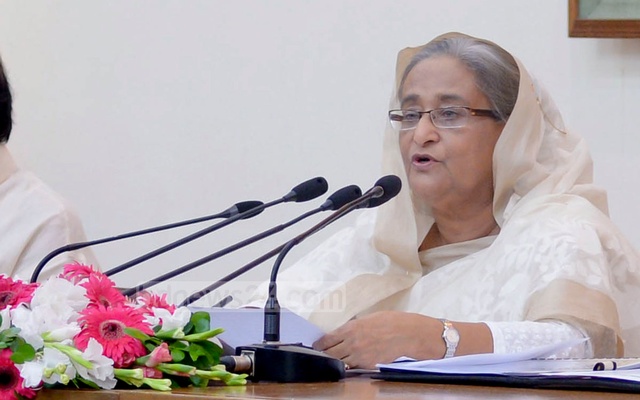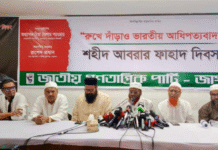Prime Minister Sheikh Hasina has issued a strong rebuttal of the “propaganda” and “politically-motivated rhetoric” by the anti-Rampal campaign, saying those who failed to deliver even one megawatt of power were resorting to lies to malign her government.
“Those who looted and failed to produce even one megawatt and killed people who protested are now crying hoarse,” Hasina told a press conference at her official residence on Saturday afternoon.
“We did quick rentals, but that was no permanent solution,” she said, “and even that drew fierce criticism from these people.”
She took a dig at former prime minister and BNP chief Khaleda Zia and cited data and statistics to say that her political foe was trying to foment unrest with “completely false, fabricated and doctored data”.
“If coal-fired power plants were that bad, why would a country like Japan go for it?” she asked. “Very recently, Japan has given go-ahead to coal-fired plants to produce 7,000 megawatts of electricity.”In China, she said, work on as many as 300 coal-powered plants is ongoing.
In the United States, she said, the 1,300-megawatt coal plant in West Virginia was located within one kilometre of the National Park.
In Germany, there are plants located in cities, she said.
The prime minister showed photographs of major coal-powered plants in different countries to assert the anti-Rampal campaign was a mere propaganda.
‘Plant won’t harm Sundarbans’
Prime Minister Sheikh Hasina has said since coal-based power plants need cheap transport systems they are usually built near coal mines or coasts or rivers with good navigability. That was the reason, she said, why Rampal in the coastal district of Bagerhat was chosen for setting up the plant.
She said the other factor considered while choosing a place for any project was relocating a minimum number of people.
Dismissing BNP chief Khaleda Zia’s claim that an 8,000-strong population in a 1,834-acre area had been evicted for the project, Hasina said there was no permanent habitation in the ‘actually’ 915-acre land for the plant. “Only low-lying barren fields have been filled up.”
“Of the area, 465 acres will be used for the main plant. The rest of the place will be used for solar panels and plantation,” she said.
The prime minister said people in the area dependent on the Sundarbans would not need to cut down trees once the plant was set up since Tk 300 million from the power plant company’s CSR funds had been earmarked for the socioeconomic development of the area.
“Hundreds of thousands of people will be benefited,” she said.
According to Hasina, the Rampal power plant will be built at a safe distance from the Sundarbans.
She noted that international laws bar coal-based power plants within 10 kilometres of any forest.
“This power plant will be 14 kilometres away from the perimeter of the Sundarbans and 65 kilometres from the World Heritage Site,” she said.
The prime minister pointed out that Khaleda Zia had been wrong to compare India’s law barring power plants 25 kilometres away from a forested area with that of a densely populated country like Bangladesh.
The prime minister said the plant would not affect the environment in the area because the authorities had taken steps to keep pollution of sound, water, air and light within the minimum level.
“Sound will be limited to 200 metres,” she said.
A ‘very insignificant’ quantity of water would be used, she said, from the river Pashur to generate power, and added the used water would not be made to flow back into the river.
Hasina said the power plant in Rampal would be an ultra-supercritical one and could keep the pollution level at zero.
She suggested that critics of the plant visit the subcritical coal-based power plant, having 28 percent efficiency, in Barhapukuria. The Rampal plant would be up to 43 percent efficient, she said.
The coal needed to generate power would be imported from Australia, Indonesia and South Africa, Hasina said.
She said modern technologies like Real Time Continuous Emission Monitoring System (CEMS), Electro-Static Precipitator (ESP) and Flue Gas Desulphurisation (FGD) would be used to protect the environment.
CEMS will monitor the emission of harmful gases, ESP will filter up to 99.99 percent ash, and FGD will filter sulphur.
She said the carbon dioxide emitted from the 275-metre high chimney would be limited within 1.6 kilometres from the plant.
“The air in this area flows in a direction away from the Sundarbans. It means if harmful gases are emitted, they will not reach the Sundarbans,” the prime minister said.
Source: bdnews24










